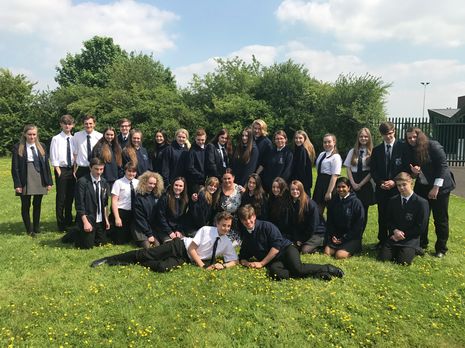Mid-league school, top-league teachers
As part of Global Action Week for Education, Alice Perkins reflects on how indebted she is to the state comprehensive she came from

To most, the words ‘Northern state comprehensive secondary school’ may conjure up images of Waterloo Road: fighting, troubled kids and teachers who sit back and let it all happen. If you would have heard what people said when I told them where I was going to high school, you would probably have thought I too was heading to face my very own Waterloo. But, unlike Napoleon, in the famous ABBA song, I did not surrender.
Attending Westhoughton High School, a middle-of-the-league table state school in Bolton, was very much a conscious decision. I had a choice: go to the local Catholic school by bus, or attend a school a matter of minutes away. I chose the latter. This raised more than a few eyebrows - why would a ‘good’ Catholic girl choose to go to such a den of vice and iniquity? Maybe because she valued more sleep in the morning? Or was willing to overlook rumours to give somewhere a chance? The real reason was very simple - the teachers were nice at the Open Evening.
In Land Economy, one of the first concepts we study are ‘places that don’t matter’. You‘re probably thinking of places without this phrase needing to be explained: places where there’s seemingly no hope for young people so they have to move to the big cities; areas that voted for Brexit for a better future; and most recently, places which at the last general election, overwhelmingly voted Conservative for the first time. Westhoughton (an ex-mining town), within Bolton (an ex-mill town), fits pretty well into this description. Don’t get me wrong, I had a happy childhood, with a loving family who I wouldn’t change for anything and who enabled my success. But there was always going to be a point where I had to face reality.
Growing up in a town where one of my few chances to move onto better things would be through education; I knew I must work hard to succeed. Cambridge was the embodiment of this aspiration. It was a beacon of academic excellence (and more recently, rigour) located beyond the town’s bounds and much nearer to that faraway land by the name of London. Whilst Cambridge is not the be-all-and-end-all, to someone from these schools it can certainly feel that way, and it did to me.
The school always did its best to support every student. Following an invite from my Year Seven Pastoral Head, I joined a summer school to meet others in similar positions. Whilst we were all from different backgrounds, and I only shared a few classes with many of them, I made reliable friends for the rest of my time there. After this introduction, even the most formidable Maths teacher quickly proved himself to be one of the most beloved, with his inspired teaching method of letting us struggle to a solution. I quickly learnt that showing interest in class would make teachers incredibly eager to help, providing assistance above and beyond that of their job title. My English teacher/form tutor, who, after five years, became like a second mum, rewrote our curriculum in year eight after intense pestering. It was at the height of the Hunger Games’ popularity so planned teaching changed to the theme of dystopia, culminating in writing my very own dystopian tale which shared more than a few similarities with Divergent. This was on top of the Year Seven film topic - I am proud to say my first ever academic essay was on the topic of Shrek.
"Most crucially, the real lessons were not timetabled"
More crucially, the real lessons were not timetabled. My fondest memory (and least fine hour) was during DofE. After getting lost for seemingly hours in moorland, I wasn’t feeling the best. In comes a History teacher: a proud, Barnsley-supporting Yorkshireman who loved walking the hills. His solution was simple - a cup of his ‘most ‘orrible tea’ - served complete with a floating blade of grass on top (only the absolute finest of haute cuisine can be served on DofE). Chaos ensued as an argument developed between my staunch refusal to drink the world’s worst cup of tea and the rest of the group, who I now realise were looking out for my welfare. I drank the tea.
Straight after this excursion into the Pennines, I went on a link area access scheme visit to St John’s. Having initially seen it as a fun jaunt across the country, staying in Cambridge, with a full itinerary aimed at mythbusting the entire world I now inhabit was vital. Access schemes, with the insight they provide into life as a student, are undeniably important in giving confidence to students from schools like mine that they can contribute to writing the history held in college walls.
A special acknowledgment goes out to my school’s Geography department for always brightening the darkest day - even if the classroom did have the same feel as Friday Fez. The real value of an education is holistic, not just knowing how to review a film in French. All of the experiences I’ve mentioned here, and many more, were formative, and prove that outside classroom doors, there is both an equally valuable world of progression and development, with the chance for teachers to have significant impact.
As anyone who went to a school like this can attest, the people are who really make it. My peers were the crux of my time at school, as we pushed each other to do better and go further. At the same time, not everybody was academically minded. The school had the social issues you’d expect. Though some would never be overcome, the staff eased the burden. Westhoughton placed huge importance on being a good person, emphasising the value of citizen over self, and fundamentally, good morals as opposed to good results - a philosophy which still influences me.
"The school placed huge importance on the value of citizen over self"
All this is not to say it didn’t have its moments. As the year’s only Catholic, I did at times have to explain certain aspects of the faith to a mainly CofE crowd - women priests were always a point of contention. I was always aware of my outsider status with religion, being the only person to attend Westhoughton from my Catholic primary school. Many of the others attended primary school together, sharing a commonality in school songs and church service stories. Maybe this is why I found comfort in GCSE RE lessons, with my year seven Pastoral Head. Catholicism for me is not so much going to church, but the culture and lifestyle attached, both of which I could take pride in for a few hours a week.
The school buildings themselves were good enough, but some rooms were due a serious upgrade. The science labs were etched with the names of generations of students past and a few floors did feel like you’d fall through them if you stepped on them the wrong way. Though I feel this made IT lessons like a real-life Jungle Run. We should have had a new school building under Building Schools for the Future, but austerity cancelled it weeks before final contracts were meant to be signed - indicative of typical ‘left behind’ behaviour.
As time went by, the year group split up, going to different colleges and following our own paths, that I can now only observe from afar through the lens of Instagram and Facebook. Being back home from university has forced me to reflect on my life now. Physically we live houses apart, but mentally, I’m in the grounds of Pembroke, 200 miles away. I recently remembered a passage I sent to my Pastoral Head just after matriculation:
‘Cambridge needs more students from Westhoughton High's background - those who have interacted with a broad range of people, from different social classes… it can only work to make the country a better place.’
This Global Action Week for Education, we must recognise the inherent value in these schools which are written off before they have a chance to prove their worth. At Cambridge, the proliferation of private and grammar schools leaves little room for those who went to the middling schools to be heard. Every single member of staff at these schools works to change a life. These are the schools of the majority and to form a more cohesive society, we need to recognise and appreciate their important role.
 News / Colleges charge different rents for the same Castle Street accommodation2 March 2026
News / Colleges charge different rents for the same Castle Street accommodation2 March 2026 News / King’s hosts open iftar for Ramadan3 March 2026
News / King’s hosts open iftar for Ramadan3 March 2026 Theatre / Lunatics and leisure centres 4 March 2026
Theatre / Lunatics and leisure centres 4 March 2026 News / Angela Merkel among Cambridge honorary degree nominees27 February 2026
News / Angela Merkel among Cambridge honorary degree nominees27 February 2026 News / News in Brief: waterworks, wine woes, and workplace wins 1 March 2026
News / News in Brief: waterworks, wine woes, and workplace wins 1 March 2026








